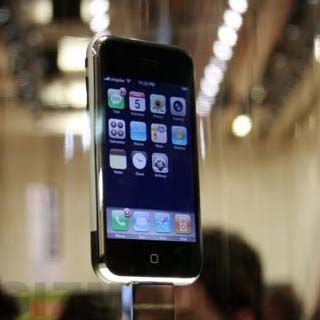Sunday, May 2: The A.D.D. Detective
NEWSWORTHY
by Leigh Lundin
A Silicon Valley engineer celebrates his 27th birthday in a Redwood City pub. A little tipsy, he leaves his cell phone on a barstool before he leaves the bar.
Customer finds phone and discussions ensue how to return it. Customer leaves bar with cell phone. Next morning, the cell phone is dead, disabled remotely. Customer tries at least once to return it, to no avail.
Normally, that would be the end of the story.
But…
It isn’t an ordinary cell phone– it’s an iPhone. And it isn’t an ordinary iPhone.
The phone is Apple’s next generation prototype disguised to look like the current model.
Customer phones Apple and tries to return it, reaching low-level tech support who assume it’s a Chinese knockoff or a hoax. Apple is so legendary for its security, no one takes seriously one of their prototypes might end up on a barstool in a German beer garden in Redwood City, California.
Customer next approaches hi-tech geek sites. Gizmodo confirms the story and pays $5000 for a look at the device before returning it to Apple. They pry off the shell of an ordinary iPhone revealing a shiny jewel of technological wonder.
Gizmodo takes the thing of beauty apart and confirms it’s an awesome Apple product with awesome Apple components assembled in a new and awesome Apple way. They write the story about its awesomeness and film a report with full disclosure.
At the same time, Gizmodo offers the device to Apple if they formally request it back. They also urge leniency dealing with the engineer who lost the phone on his birthday.
After much hemming and hawing, Apple attorneys craft a suitably vague letter and Gawker Media (Gizmodo’s parent company) provides Apple with the reporter’s address to make arrangements to retrieve the phone, which apparently took place.
Normally, that would be the end of the story.
But…
| California Code |
|---|
|
Margaret Warren could answer this better than I, but apparently the law in California indicates that a person who takes possession of a lost item becomes a depositary for the owner, meaning they are obligated to notify the owner and return said item without asking for anything other than reasonable costs. Another blog put it this way: Anything unintentionally lost and not returned may be considered stolen (presumably distinguished from things intentionally lost, such as Yugos and virginity). According to DA Wagstaffe, to bolster their legal position, the hapless Apple employee and the DA’s office are no longer calling the phone "lost" but "stolen". |
Police batter in the door of the Gizmodo’s editor’s apartment, seizing company computers, hard drives, servers, cameras, notes, and a file of business cards. Police and prosecutors are apparently on a hunt to discover anything that might be discovered. Note that the iPhone had already been returned to Apple, apparently without charge for Gizmodo’s $5000 outlay.
Prosecutors want to investigate Gizmodo’s computer files to determine if they can put together evidence of a felony. Such a search upon ordinary citizens might be outrageous, but it seems unthinkable against a news outlet. However, San Mateo County’s chief deputy district attorney, Stephen Wagstaffe, claims reporter shield laws do not apply to Gizmodo. According to police sources, the DA’s office is prepared to go after other blogs as well.
Unconfirmed reports from Wired claim that "Apple police" fruitlessly (sorry about the pun) knock on the door of the original cell phone finder and demand to search his place, too. (It should be noted that Apple is on the board of the task force responsible for the raid.)
What’s going on here?
The Daily Show has its own take.
The Fourth Estate
Those who read this column know I often write one thing while I’m really thinking about something else. That happens to be true in this case.
Those of us who appreciate hard news (and hard-earned news reporting), bemoan the deaths of reputable newspapers around the nation. For more than two decades, newspapers have been dying, withering, and blowing away in a dust storm of new technology combined with a disdain of journalism while embracing opinions disguised as news.
The term ‘fourth estate‘ comes to us from Thomas Carlyle quoting Edmund Burke about Parliament (Congress in our case): "Burke said that there were three Estates in Parliament, but in the Reporters Gallery yonder, there sat a fourth Estate more important far than they all."
Politicians, police, and prosecutors have a reputation of detesting news media, but the fourth estate is most important because it keeps an eye on government and its minions. A free press helps keep a people free and won’t be fully appreciated until it’s gone.
The Death of Journalism
Popular commentary argues the loss of the great news organizations doesn’t matter because news is ‘democratized’ thanks to the internet and blogs, which helped kill off newspapers. This theory has several departures from reality, notably that the quality of reporting depends upon the commitment to integrity and the resources available, both which are in questionable supply in one place or another in the blogosphere.
Frighteningly, the courts, led by a strained misinterpretation of a New Jersey decision and aggressive actions by the Transportation Security Administration, have begun to rule that news blogs don’t meet the standard of legitimate news organizations. The courts use this ambiguous standard to knock down press shield laws, preventing reporters from protecting their sources.
To overly simplify the circular legal reasoning: Prosecutors contend news blogs aren’t professional because they can’t protect their sources and reporters can no longer protect their sources because they aren’t professional. Yes, other considerations are involved such as paying for stories (à la National Enquirer), but the gist is that with the loss of the great news organizations, professional journalism hasn’t moved to the World Wide Web, it’s blown away.
Final Judgment
This is the story behind the story: If courts continue to rule news blogs aren’t news-worthy, so to speak, we stand on the brink of losing our freedom of the press. The one thing we can do is… blog about it.





















Great article. I am staggered at the heavy-handed response of the authorities!
This version of the iPhone may prove a best-seller on CB. See #9.
Dangerous ground – Look at every dictatorship in Africa, plus a few ‘democracies’ and most began with curtailing freedom of the press – the thin edge of the wedge.
An informative article. I just hope Apple doesn’t come after you for exposing the lengths to which they are willing to go to punish anyone they think may have exposed their secrets.
I also hope the Apple story didn’t come from one of your sources.
My lips are sealed, Louis!
Scott Adams has a couple of web-only Dilbert comic strips about it.
Lufthansa offered the engineer who lost the iPhone a free trip to Germany to sample more German beer. I think German firms invited him to bring as much Apple techology as he likes because everyone knows German authorities are laid-back fellows.
Margaret says she’s not certain with regard to the exact state of California law on this matter—remember, she’s a legal ethics attorney, not a criminal attorney—but she’s dead certain that since such a device is traceable and might contain personal and confidential information, when the finder couldn’t return it directly to the owner, for whatever reason, the proper thing to do would have been to turn it in to the police. Otherwise there is clear liability on the part of the finder.
There’s a lot of ‘language’ going on: the DA refers to the phone as “stolen”, not lost, while Gizmodo says they didn’t purchase the phone, but paid for right of access before returning it to Apple. It’s not clear exactly who is being punished for what, except for the First Amendment, Freedom of the Press.
3rd May: World Press Freedom Day